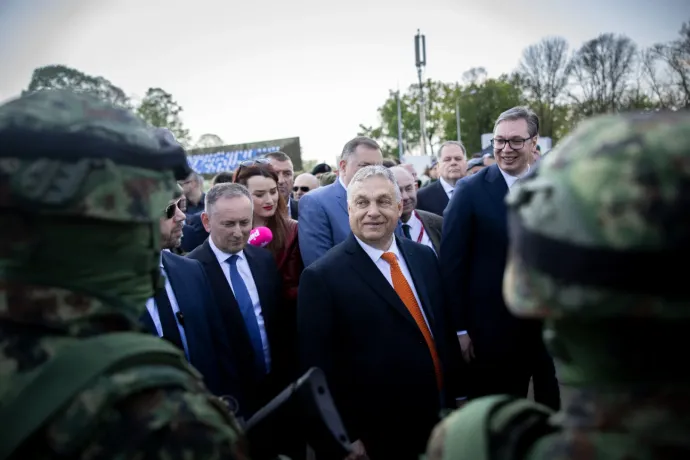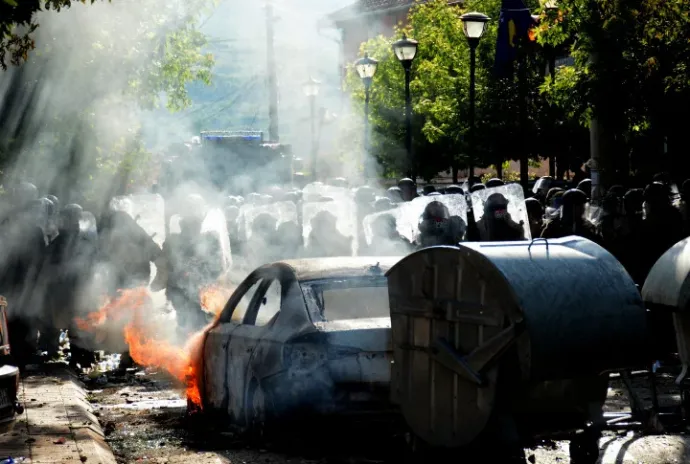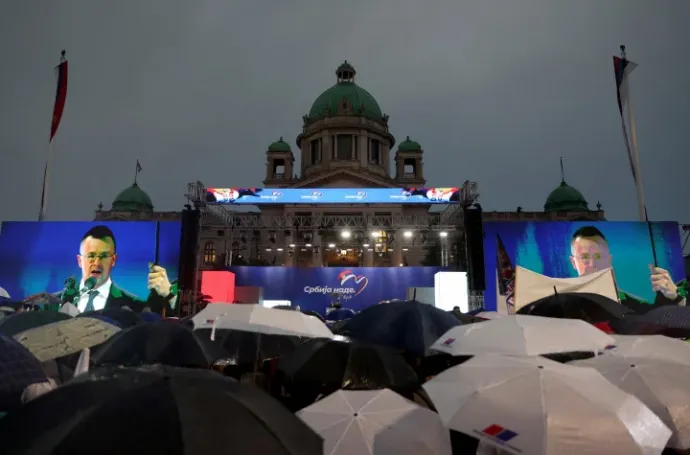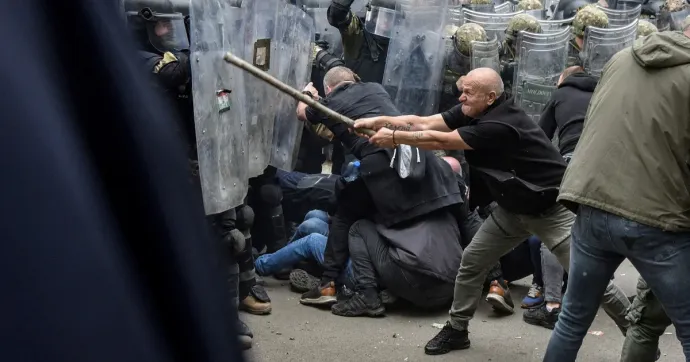Why it's a failure of Hungarian foreign policy if Hungarian peacekeepers in Kosovo were attacked with Belgrade's prior knowledge

Last week's clash between the Serbs in northern Kosovo and KFOR is partly a failure of the EU, but also of the Hungarian government. Because of its eccentric foreign policy, the government of Viktor Orbán has fewer and fewer friends and is forced to tolerate it when Hungarian peacekeepers are attacked with the prior knowledge of one of these allies – in this case, Serbia.
Repeating the municipal elections in northern Kosovo, which were marred by unrest, could save the Hungarian Government from the controversial situation it finds itself in with regard to its foreign policy towards Serbia, after twenty-seven Hungarian soldiers of the NATO peacekeeping force KFOR were injured during the protests of Serbs in northern Kosovo.
Orbán's friend may still cause problems for the Hungarian peacekeepers
Last week's unrest highlights a contradiction that is difficult to resolve: Viktor Orbán's government has extremely good relations with the Serbian leadership, which doesn't recognise Kosovo, while at the same time it takes part in KFOR because Hungary recognizes Kosovo. In this capacity, Hungarian peacekeepers must prevent clashes between the Serb minority and the Albanian majority, but if necessary, they must also prevent the Serb army from crossing the border into Kosovo.
Following the incident between the Serb minority and KFOR, Serbian President Aleksandar Vučić placed the Serbian army on high alert and deployed forces to the border of Kosovo, which he does not recognise, thus setting a new task before KFOR, the third biggest contingent of which is made up of 469 troops from Hungary, after the Italians and the Americans. While the Serbian Foreign Minister stated that the Serbian army had no intention of intervening, a few months earlier he had also said that Serbia was always ready to intervene to protect the Serbian community in Kosovo.
The clash in Zvečan came as a direct result of the early municipal elections held in April in four municipalities in northern Kosovo – Zvečan, Leposavić, Zubin Potok and the Serb-inhabited northern part of Kosovska Mitrovica across the Ibar River, which is separate from the Albanian part to the south, with KFOR forces on duty on the bridge between them. The election was necessary because Serb members of the local council there had resigned last year. However, the April elections were boycotted by the Serb population, so the new mayors were elected based only on Albanian votes.
More than 90 percent of Kosovo's population is Albanian, but Serbs are in the majority in the northern tip of the country. Since they did not participate in the elections, only 1600 voters of Albanian nationality decided on the new mayors instead of the 45,000 eligible to vote in the region. The new mayors of the municipalities of Zvečan, Leposavić and Zubin Potok took their oaths of office last week. However, they were prevented from taking office by the Serbs who took to the streets, which forced KFOR to intervene, but only led to further unrest – it was during these events that twenty-seven Hungarian peacekeepers were injured, along with several other KFOR soldiers.
The contradictory nature of the Hungarian involvement is further highlighted by the fact that Serbian protesters standing up to the Hungarian KFOR soldiers were hailing Hungarian Prime Minister Viktor Orbán during the unrest – a sign of the excellent relationship between Vučić, who leads Serbia and is traditionally seen as enjoying the close support of Russia, and Orbán, who is widely criticized within the EU for being too friendly towards Moscow.

Szijjártó at the Serbian peace rally
This is also evidenced by the fact that while the clashes in Zvečan were going on, a pro-government peace rally was held in Belgrade, at which Péter Szijjártó was an invited guest and gave a speech in Serbian. In his speech, the Hungarian Minister of Foreign Affairs and Foreign Trade blasted the global liberal mainstream, which punishes those – including Hungarians and Serbs – who stand up for their national interests. (The event also featured a speech by Bosnian Serb leader Milorad Dodik, who – while on the sanctions list of the United States and the United Kingdom for his separatist policies that threaten the unity of an already fragile Bosnia and Herzegovina – has been a welcome guest at government events in Budapest.)
The Hungarian government already made a gesture to Serbia in January, when Péter Szijjártó said that Hungary doesn't support Kosovo's admission to the Council of Europe. The Hungarian Foreign Minister made the announcement during his Serbian counterpart's visit to Budapest. Ivica Dačić, who was also Serbian prime minister between 2012-14, was more compromising on Kosovo in the past decade. While he didn't support the recognition of its independence, he did say that it is self-deception to consider Kosovo part of Serbia, because the reality is that it isn't.
(Kosovo came under international protection in 1999, after the Yugoslav army, then still made up of Montenegro and Serbia, began ethnic cleansing in Kosovo, which, at the time, was still part of Serbia. Kosovo, which was the scene of important events in Serbia's history has had a growing Albanian majority beginning in the 20th century, and its independence was recognised in 2008 by a significant part of the Western world, the United States and a large majority of the EU, including Hungary.)
In his January meeting with Dačić, Szijjártó also explained how Hungary's participation in KFOR is possible while rejecting Kosovo's membership in the EC: Hungary is interested in a peaceful solution through dialogue and compromise, which is why it has previously assumed the leadership of NATO's peacekeeping operation in Kosovo (KFOR). However, he said, the success of the search for a compromise could be jeopardized if various European formations were to prematurely include Kosovo as a member.

In the context of Russia's war against Ukraine, the stance may further be interpreted as a gesture from Budapest not only towards Belgrade but also towards Moscow, which doesn't recognise Kosovo either. This also comes up in light of the fact that there are five EU Member States – Cyprus, Greece, Romania, Spain and Slovakia – which do not recognise Kosovo as an independent state, while Hungary does. The latter ones haven't been accused of, or have only been partly criticized in the past for being too open to cooperation with Russia, which runs counter to the EU's majority position.
At the January meeting, Szijjártó also said that Hungary's "guarantee of energy security" now lies with Serbia, as the TurkStream is currently the only gas pipeline on the continent operating at 100 percent capacity in the east-west direction. He stressed that 4.8 billion cubic meters of natural gas entered Hungary via Serbia last year, which is close to half of the country's total consumption, while 438 million cubic meters were transported in the other direction. Trade between the two countries reached a record high last year, increasing by 75 percent. So part of the reason for the close relationship with Serbia is the same as in the case of Russia (i.e. securing energy supplies), where Hungary views the war in Ukraine differently from many EU and NATO members, and is reluctant to take a position against it..
The Hungarian government is silent
It was striking that while KFOR condemned the clashes in a statement, the Hungarian government was remarkably restrained in its reaction, considering the seriousness of the clashes and the high number of wounded Hungarian soldiers – Viktor Orbán, for example, didn't even speak out on the matter.
The clashes were also denounced by the Italian Prime Minister, with whom Orbán had previously hoped to build a close political alliance – but this was also thwarted by the war in Ukraine, and Giorgia Meloni’s clear condemnation of Russian aggression. Among the Italian-led KFOR, 11 Italian soldiers were wounded during the clashes, so most of the casualties came from the Hungarian contingent.
The injured Hungarian soldiers who were repatriated last week received a visit from the President who is also the Commander-in-Chief of the Hungarian Armed Forces. Katalin Novák thanked the soldiers for their bravery, but did not comment on the attack against them.
There is no doubt that the Albanian leadership is also responsible for the situation that led directly to the riots – the US embassy in Kosovo said in a statement. The Hungarian government's restraint in tackling the actions of the Serbian minority and its responsibility for the attack on Hungarian soldiers is, however, without doubt due to the narrowing leeway of Hungarian foreign policy. As a result of its constant bashing of the EU and NATO, the Hungarian government is forced to swallow such an atrocity if it is committed by the dwindling number of one of its allies.
There is no question that the Serbian government is behind the Serbian minority in Kosovo, so much so that Serbian Serbs and even a professional Serbian policeman are suspected of having been involved in the riots, some of whom have even been identified by name. However, the Foreign Ministry, which at other times has been known to loudly summon ambassadors, has not called Belgrade to account for the fact that Hungarian peacekeepers were ultimately attacked by representatives of the Serbian authorities.

The riots are also a debacle for the EU
The Kosovo situation as a whole is not, of course, a foreign policy failure of just the Hungarian government, but that of the EU, which in March, before the elections, believed that it would successfully defuse the tension: Josep Borrell, the High Representative of the European Union for Foreign Affairs and Security Policy met with the Kosovo Prime Minister and the Serbian President in Ohrid, where they confirmed that they would normalize their relations, accept each other's official documents and facilitate border crossings.
Belgrade also promised that it wouldn't obstruct Kosovo's admission to international organizations. In return, Prishtina committed tp guaranteeing self-government for the Serb minority. However, Prishtina has not established the promised Community of Serb Municipalities in Kosovo, and the Serbian President later said that he did not sign anything at the Ohrid meeting, which made it clear even then that the parties had not found a long-term solution at the meeting.
However, a short-term solution to the situation – and at the same time a way out of the controversial situation for the Hungarian government – could be the holding of new local elections with the meaningful involvement of the Serbian minority. The President of Kosovo made a statement to this effect. Vjosa Osmani made her remarks following last Thursday's meetings with Vučić, French President Emmanuel Macron, who also stressed the responsibility of the Kosovar Albanian leadership, German Chancellor Olaf Scholz and EU High Representative for Foreign Affairs and Security Policy Josep Borrell during the European Political Community summit.
While intentions alone are not enough, EU leaders gave Prishtina and Belgrade a week to respond to their proposals. So for the time being, there is no end to the tension which has led to the most serious confrontation in Kosovo in 20 years.
For more quick, accurate and impartial news from and about Hungary, subscribe to the Telex English newsletter!